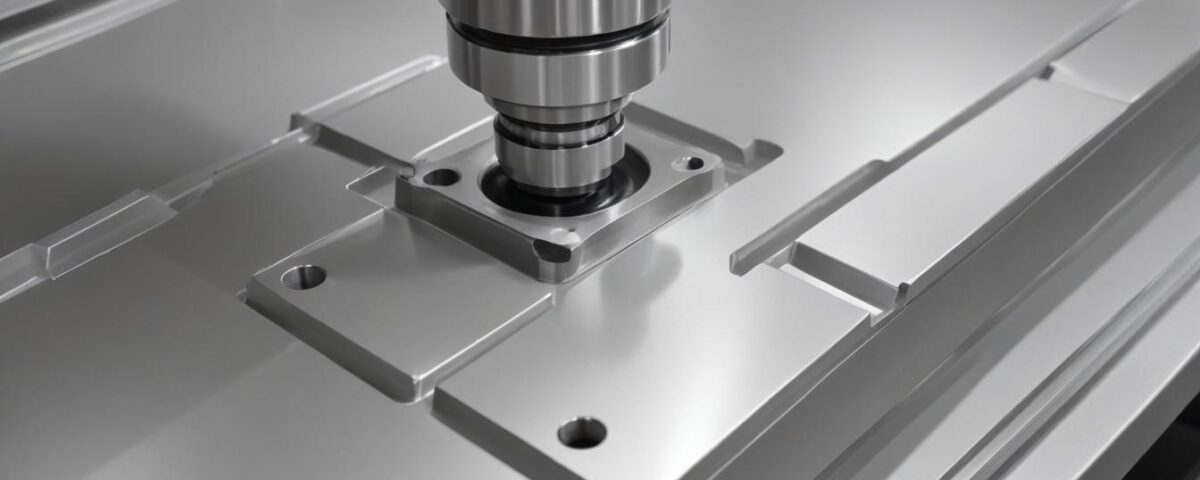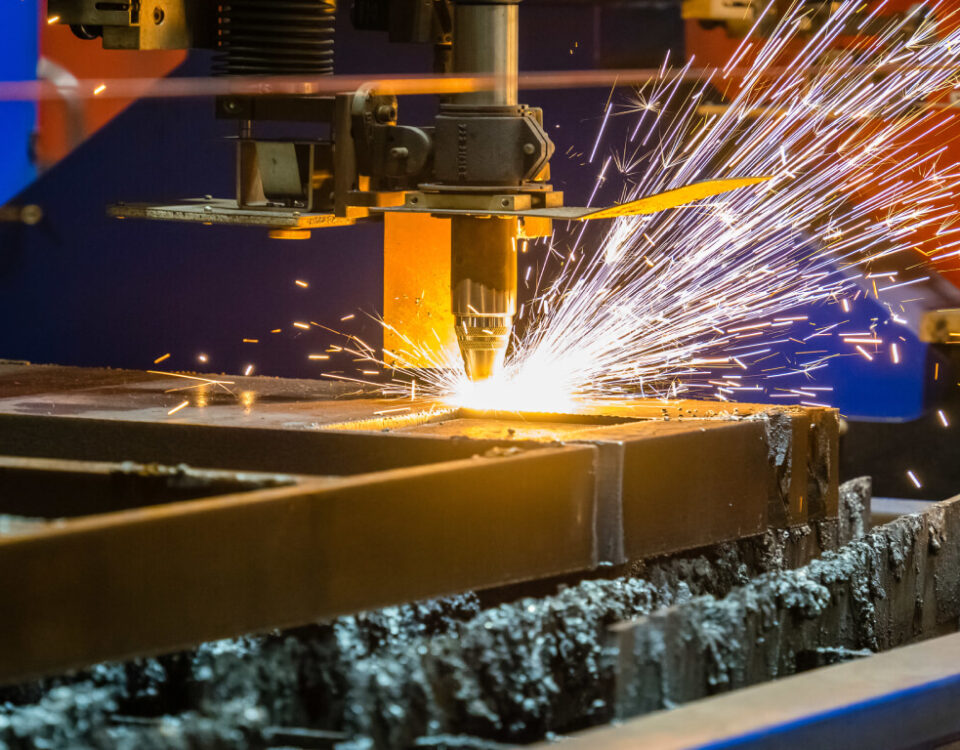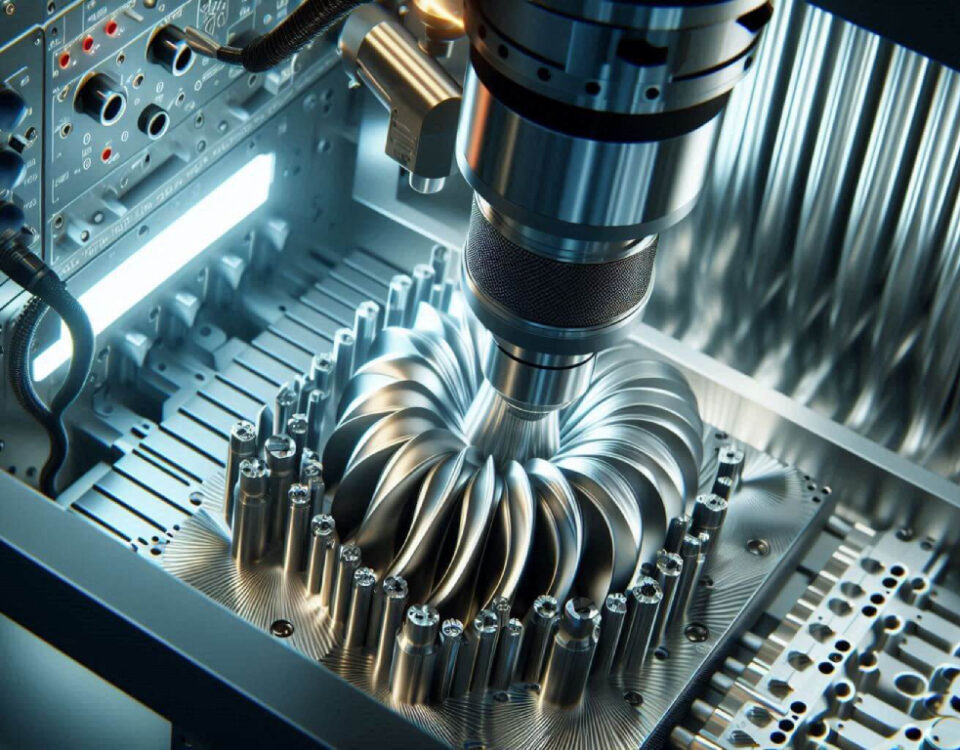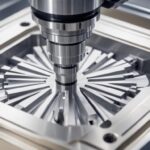
Fabrication Process Optimization: How CNC Machining Leads the Way
22 October 2024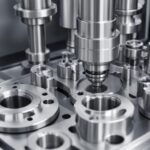
The Future of the CNC Machining Industry: Innovations and Opportunities
28 October 2024CNC (Computer Numerical Control) machining stands out as a revolutionary technology that has transformed how metal components are produced. This precision-driven method utilizes computer programming to control the movement of machinery and tools, enabling manufacturers to create intricate parts with exceptional accuracy and repeatability. As industries demand increasingly complex designs, CNC machining plays a crucial role in meeting these challenges, driving advancements across sectors such as aerospace, automotive, and medical devices.
However, the high precision and quality of CNC machining come with their own set of challenges. Metal parts are often exposed to harsh conditions, including friction, heat, and corrosive environments. To combat these issues, protective coatings are essential. Among the various types of coatings available, polyester coatings have gained significant attention for their unique properties and benefits. This blog post will explore why polyester coating is vital in CNC machining processes, highlighting its role in enhancing metal durability, performance, and overall cost-effectiveness.
1. What is Polyester Coating?
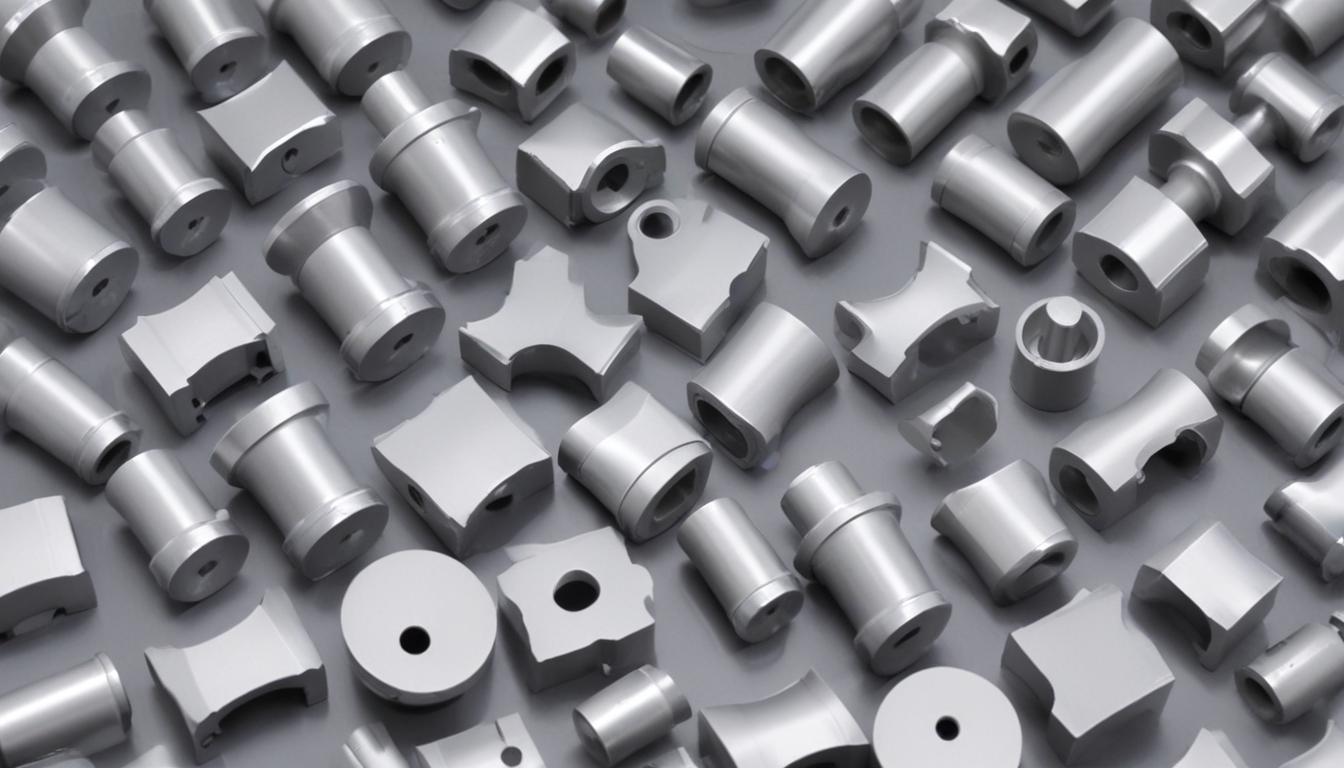
Definition and Composition of Polyester Coating
Polyester coating is a type of protective finish made from polyester resin, a synthetic polymer derived from the reaction of organic acids and alcohols. This coating process involves applying a liquid or powder polyester to a substrate, such as metal, and then curing it to form a durable, hard surface. The curing process often involves heating, which promotes chemical reactions that enhance the coating’s strength and adhesion.
The composition of polyester coatings can vary, but they generally consist of:
- Polyester resins: These form the backbone of the coating, providing strength and flexibility.
- Additives: Various agents are included to improve properties such as UV resistance, anti-corrosion, and chemical stability.
- Pigments: For coloring, providing aesthetic appeal and additional UV protection.
- Solvents or carriers: Depending on the application method, these help to apply the coating evenly.
Types of Polyester Coatings Used in Industrial Applications
Polyester coatings come in several types, each suited for specific industrial applications:
-
Thermosetting Polyester Coatings:
- These coatings are cured by heat, creating a strong, cross-linked network that enhances durability and resistance to wear. Commonly used for outdoor applications due to their excellent UV stability.
-
Thermoplastic Polyester Coatings:
- Unlike thermosetting coatings, thermoplastic coatings remain pliable after curing. They can be reprocessed and reshaped when heated, making them suitable for applications requiring flexibility.
-
Polyester Powder Coatings:
- Applied in a dry powder form, these coatings are electrostatically charged and then cured in an oven. They provide a thick, even finish and are popular for metal parts in various industries due to their durability and environmental friendliness.
-
Polyester Liquid Coatings:
- Typically used in spray applications, these coatings can be formulated for various specific properties, including gloss levels and drying times, making them versatile for many metal finishing processes.
Characteristics That Make Polyester Coating Stand Out
Polyester coatings are distinguished by several key characteristics that contribute to their widespread use in industrial applications:
-
Durability: Polyester coatings are highly resistant to scratches, impacts, and general wear and tear, making them ideal for protective finishes on metal surfaces.
-
Chemical Resistance: They offer excellent protection against various chemicals, including acids and solvents, ensuring the integrity of the underlying metal in harsh environments.
-
UV Stability: Polyester coatings maintain their color and gloss over time, even when exposed to sunlight, reducing the need for frequent reapplication and maintenance.
-
Thermal Stability: These coatings can withstand elevated temperatures, making them suitable for applications where heat resistance is critical.
-
Aesthetic Appeal: Polyester coatings can be formulated in a wide range of colors and finishes, allowing manufacturers to achieve the desired appearance for their products.
-
Environmental Benefits: Many polyester coatings are low in volatile organic compounds (VOCs), making them more environmentally friendly compared to traditional solvent-based coatings.
2. The Importance of Metal Protection in CNC Machining
Explanation of How CNC Machining Processes Affect Metal Surfaces
CNC machining is renowned for its ability to produce high-precision components from various metal materials, including aluminum, steel, and titanium. However, the very processes that create these intricate parts can significantly impact the quality and longevity of the metal surfaces involved.
During CNC machining, several factors can lead to degradation of the metal surfaces:
- Mechanical Stress: The cutting tools apply significant force on the metal as they carve out specific shapes. This can lead to micro-abrasions, tool marks, and even fatigue in the material, compromising its structural integrity over time.
- Heat Generation: The friction between cutting tools and metal generates heat, which can alter the physical properties of the metal, potentially leading to thermal distortion or warping if not managed properly. High temperatures can also lead to oxidation, resulting in a rust-prone surface.
- Debris Accumulation: Chips and shavings produced during machining can cling to the surface of the metal, creating areas of stress concentration that may lead to corrosion or wear if not removed properly.
Common Challenges: Corrosion, Wear, and Environmental Exposure
Despite the advancements in CNC machining technology, metal components face numerous challenges that threaten their durability:
-
Corrosion: One of the most significant threats to metal surfaces is corrosion, which can result from exposure to moisture, chemicals, and other environmental factors. Corrosion not only weakens the metal but can also lead to complete failure of the component if left unchecked.
-
Wear: Continuous mechanical interactions during machining can cause wear on metal surfaces, reducing the accuracy and performance of the parts over time. This wear can manifest as loss of material, pitting, or changes in surface finish, ultimately affecting the part's functionality.
-
Environmental Exposure: Metals are often exposed to a variety of environmental factors, including humidity, temperature fluctuations, and industrial pollutants. These factors can accelerate both corrosion and wear, emphasizing the need for effective protection.
The Need for Protective Coatings to Extend the Life of Metal Parts
Given the inherent challenges faced by metal components in CNC machining, the use of protective coatings becomes essential. Coatings serve as a barrier between the metal surface and the environment, providing numerous benefits:
-
Enhanced Corrosion Resistance: Protective coatings can significantly reduce the risk of corrosion by creating a barrier that prevents moisture and chemicals from reaching the metal surface. This is particularly crucial in industries such as aerospace and automotive, where exposure to harsh environments is common.
-
Reduced Wear: Coatings can provide a smoother surface finish, which minimizes friction during operation and reduces wear on both the coated metal and any interacting components. This leads to longer-lasting performance and reduces the need for frequent replacements.
-
Improved Aesthetics: Beyond protection, coatings can also enhance the visual appeal of metal parts. With options for various colors and finishes, coatings can improve product presentation and brand image.
-
Cost-Effectiveness: By extending the life of metal parts, protective coatings help reduce maintenance costs and downtime. This translates to more efficient production processes and better overall profitability.
-
Increased Safety: In some applications, protective coatings can also enhance the safety of metal components by reducing the likelihood of failure due to corrosion or wear, ensuring that parts function reliably under demanding conditions.
3. Why Polyester Coating is an Ideal Choice for Metal in CNC Machining
Heat Resistance: How Polyester Coating Protects Metal from High-Temperature Operations
One of the most significant advantages of polyester coatings is their heat resistance. During CNC machining processes, components often experience elevated temperatures due to the friction generated between cutting tools and metal surfaces. This heat can lead to various issues, including thermal distortion and changes in the metal's properties.
Polyester coatings are specifically formulated to withstand high temperatures, maintaining their integrity and protective qualities even in extreme conditions. The thermal stability of polyester allows it to:
- Prevent oxidation and corrosion that can occur when metals are exposed to heat.
- Protect against surface degradation, helping maintain the dimensional accuracy and finish of machined parts.
- Enhance the overall performance of the component by ensuring that the coating remains intact, thereby providing ongoing protection during machining and in operational environments.
Chemical Resistance: Its Ability to Shield Metals from Harsh Chemicals and Environments
In many industrial applications, machined metal parts are exposed to a variety of harsh chemicals, including acids, solvents, and other corrosive substances. The chemical resistance of polyester coatings is a vital feature that helps protect metal surfaces from these potentially damaging exposures.
Polyester coatings provide a robust barrier against chemical attack by:
- Preventing the penetration of harmful substances into the metal, thereby reducing the risk of corrosion and degradation.
- Maintaining adhesion and structural integrity in the face of repeated exposure to chemicals, ensuring that the coating does not break down or fail over time.
- Offering flexibility in formulation, allowing manufacturers to tailor the coating for specific chemical environments, enhancing protection based on application needs.
Durability: Long-lasting Protection Against Wear and Tear During CNC Machining
Another key advantage of polyester coatings is their durability. In the context of CNC machining, where parts undergo significant mechanical stress and wear, having a resilient protective layer is crucial.
The durability of polyester coatings is evident in several ways:
- Resistance to Abrasion: Polyester coatings are designed to withstand physical wear, providing a hard surface that minimizes damage from mechanical interactions during machining and subsequent operations.
- Longevity: The inherent properties of polyester allow for long-lasting performance, reducing the need for frequent re-coating or maintenance. This translates to cost savings and increased efficiency in manufacturing processes.
- Impact Resistance: These coatings can absorb shocks and impacts, further protecting the underlying metal from damage caused by sudden forces or falls during handling and transportation.
Flexibility: Polyester Coating’s Adaptability for Various Metal Substrates
Flexibility is another standout characteristic of polyester coatings, making them suitable for a wide range of metal substrates. This adaptability is essential for manufacturers looking to achieve optimal performance across different applications.
The flexibility of polyester coatings allows them to:
- Adhere effectively to various metal surfaces, including aluminum, steel, and titanium, ensuring comprehensive coverage and protection regardless of the substrate.
- Be applied using different methods, such as powder coating or liquid application, allowing manufacturers to select the most efficient application process for their specific needs.
- Adjust to the unique physical characteristics of each metal substrate, providing a tailored solution that enhances both protection and aesthetic appeal.
4. How Polyester Coating Enhances CNC Machining Performance
Improves Surface Finish: A Smoother, More Consistent Finish that Optimizes the Function of Machined Parts
One of the key ways polyester coating enhances CNC machining performance is by significantly improving the surface finish of machined parts. A smooth and consistent surface is critical in many applications, influencing not only the aesthetic appeal but also the functional performance of the components.
The benefits of improved surface finish through polyester coatings include:
- Reduced Surface Roughness: Polyester coatings can fill in minor imperfections and irregularities on the metal surface, resulting in a smoother texture. This is essential for parts that require precise fits and tolerances, as it can help achieve better mating surfaces.
- Enhanced Aesthetics: A high-quality finish elevates the visual appeal of the component, which is crucial in consumer-facing products where appearance matters. Polyester coatings are available in various colors and finishes, allowing manufacturers to meet specific branding and design requirements.
- Optimized Functionality: A smoother surface reduces the potential for friction and wear during operation, leading to improved performance. For example, in components where fluid flow is involved, such as pipes or valves, a polished finish can enhance flow rates and efficiency.
Reduces Friction: Enhances the Precision and Efficiency of CNC Operations
Friction plays a critical role in CNC machining operations, affecting both the quality of the machined parts and the wear on the machinery itself. Polyester coatings can significantly reduce friction, leading to enhanced precision and efficiency.
The friction-reducing properties of polyester coatings contribute to:
- Improved Tool Life: By minimizing the friction between cutting tools and the metal workpiece, polyester coatings can extend the life of cutting tools. This reduces the frequency of tool changes, resulting in lower operational costs and improved machining productivity.
- Higher Machining Speeds: With reduced friction, CNC machines can operate at higher speeds without the risk of overheating or excessive wear. This enables faster production rates and better overall efficiency in manufacturing processes.
- Increased Precision: Lower friction levels help maintain dimensional accuracy during machining. The reduced heat and wear allow for more precise cutting, leading to tighter tolerances and better-fitting components.
Boosts Efficiency: How It Minimizes Machine Downtime for Maintenance and Re-Coating
Another significant advantage of polyester coatings is their role in boosting efficiency by minimizing machine downtime associated with maintenance and re-coating. In any manufacturing environment, reducing downtime is essential for maximizing productivity and profitability.
Polyester coatings enhance efficiency in the following ways:
- Longevity of Coatings: Polyester coatings are highly durable, meaning they provide long-lasting protection without the need for frequent re-application. This reduces the interruptions in production that typically occur when parts require recoating or touch-ups.
- Reduced Maintenance Needs: With the robust protection offered by polyester coatings, metal components experience less wear and corrosion, leading to a lower frequency of maintenance tasks. This not only saves time but also decreases labor costs associated with upkeep.
- Streamlined Production Processes: The combined benefits of improved surface finish, reduced friction, and lower maintenance requirements contribute to a more streamlined production process. CNC machines can operate longer and more efficiently, maximizing output and minimizing wasted time.
5. The Application Process of Polyester Coating in CNC Machining
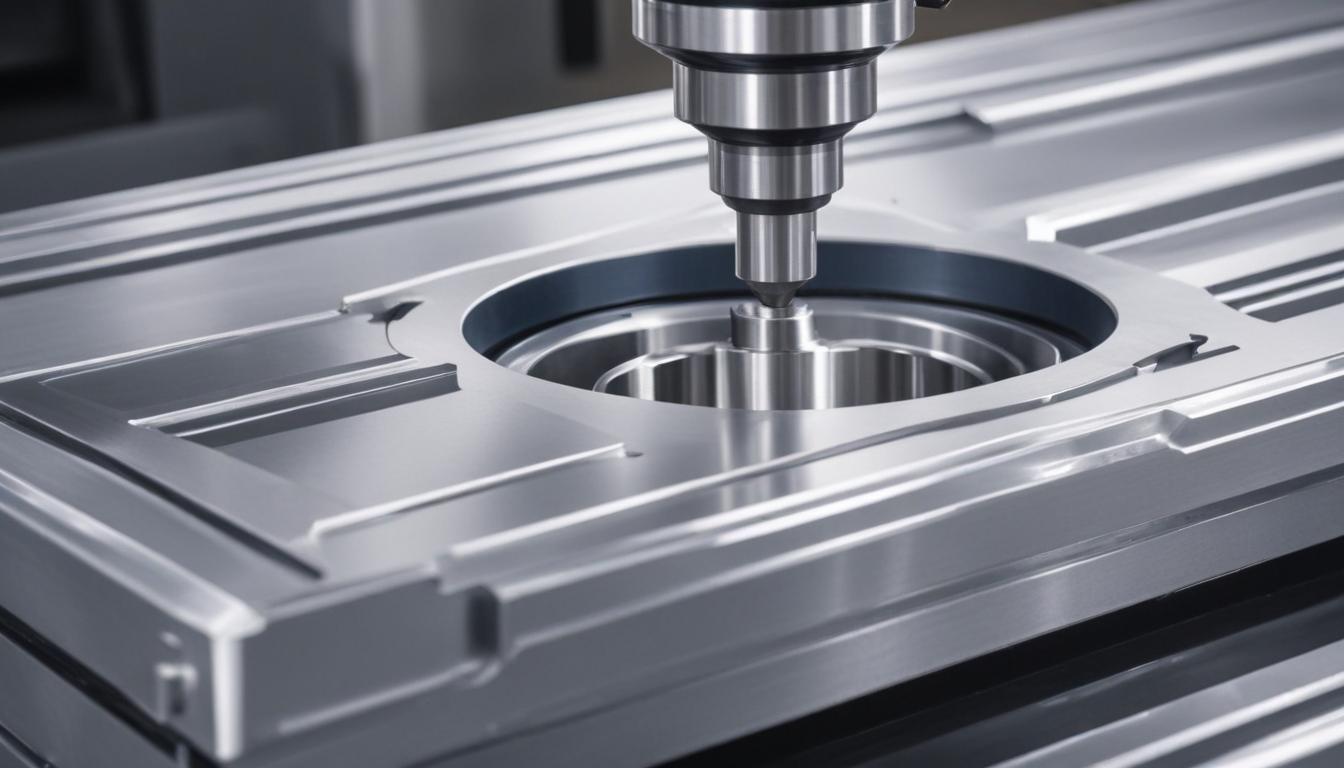
Overview of the Steps Involved in Applying Polyester Coating
Applying polyester coating to machined metal parts involves several crucial steps to ensure optimal adhesion and performance. Here’s a general overview of the process:
-
Surface Preparation:
- The first step is to thoroughly clean the metal surfaces to remove any dirt, grease, oil, or contaminants that could interfere with adhesion. This may involve methods such as abrasive blasting, chemical cleaning, or degreasing.
- Surface profiling might also be performed to create micro-roughness, which enhances the mechanical bond between the coating and the substrate.
-
Pre-treatment:
- A pre-treatment process may be applied to further enhance corrosion resistance. This often includes phosphating or anodizing, which provides a reactive surface that improves coating adhesion.
-
Coating Application:
- The polyester coating is then applied to the prepared surfaces. This can be done using different methods, including spray application, electrostatic spraying, or powder coating techniques.
-
Curing:
- After application, the coated parts are cured in an oven at specified temperatures. This curing process allows the polyester coating to chemically react and form a durable, cross-linked structure that provides the desired protective properties.
-
Cooling and Inspection:
- Once the curing is complete, the coated parts are allowed to cool before undergoing a thorough inspection. This ensures that the coating is free of defects and adheres properly to the substrate.
Different Methods of Applying Polyester Coating to Machined Metal Parts
There are several methods for applying polyester coatings, each with its advantages and suitability for different applications:
-
Powder Coating:
- This method involves applying dry powder to the metal surface using an electrostatic spray gun. The charged particles adhere to the metal, and the coated part is then cured in an oven. Powder coating is known for its uniform thickness and is often used for larger components or complex shapes.
-
Liquid Spray Coating:
- In this method, liquid polyester coatings are sprayed onto the metal surfaces using conventional or airless spray techniques. Liquid coatings can provide a smooth finish and are suitable for smaller parts or intricate designs where precise application is required.
-
Dipping:
- The metal part is submerged in a tank of liquid polyester coating. This method is less common but can be effective for uniform coverage of small parts or complex geometries. The coated part is then cured to achieve the desired hardness.
-
Electrostatic Coating:
- Similar to powder coating, this method uses an electric charge to attract charged polyester particles to the metal surface. This ensures an even coating and minimizes waste. After application, the part is cured to harden the coating.
Key Considerations in Ensuring Coating Adhesion and Consistency
To achieve the best results with polyester coatings, several key considerations must be addressed during the application process:
-
Surface Cleanliness:
- Ensuring that the metal surfaces are free of contaminants is critical for good adhesion. Any residues from machining or handling can compromise the bond between the coating and the substrate.
-
Coating Thickness:
- The application method and parameters should be adjusted to achieve the desired coating thickness. Too thin a coating may not provide adequate protection, while too thick can lead to issues such as runs or uneven surfaces.
-
Curing Conditions:
- The curing temperature and time should be strictly monitored to ensure the coating develops its full protective properties. Insufficient curing can result in a weak coating that is prone to damage.
-
Environmental Conditions:
- Application should be conducted in controlled environments where temperature and humidity are managed. Excessive moisture or contamination in the air can lead to defects such as bubbling or peeling.
-
Adhesion Testing:
- After application, it is beneficial to perform adhesion tests, such as cross-hatch or pull-off tests, to evaluate the quality of the coating bond and ensure that it meets performance specifications.
6. The Environmental and Economic Benefits of Polyester Coating
Lower Energy Consumption in Production and Application Compared to Other Coatings
One of the key advantages of polyester coatings is their lower energy consumption during both production and application compared to traditional coating methods.
-
Manufacturing Efficiency: The production of polyester resins often requires less energy than the manufacturing of other types of coatings, such as epoxy or polyurethane. This is largely due to the relatively simpler processes involved in creating polyester materials.
-
Application Process: The methods used for applying polyester coatings, especially powder coating, generally require less energy. For example, powder coatings can be applied without the need for solvents, which reduces the energy needed for drying and curing. Furthermore, since powder coatings can be applied in thicker layers without running, they may require fewer applications, thereby reducing energy consumption associated with multiple layers of liquid coatings.
-
Curing Efficiency: Polyester coatings can often be cured at lower temperatures than some alternatives, which further contributes to energy savings during the curing process. This is particularly important in industries seeking to optimize energy use and reduce operational costs.
Reduced Environmental Impact Through Lower VOC Emissions
Another significant benefit of polyester coatings is their reduced environmental impact, particularly through lower volatile organic compound (VOC) emissions.
-
VOCs and Environmental Concerns: Traditional liquid coatings often contain high levels of VOCs, which can contribute to air pollution and pose health risks to workers. In contrast, many polyester coatings are formulated to have low or negligible VOC emissions. This means that they are less harmful to both the environment and the health of those applying them.
-
Sustainability: The shift towards lower VOC products is part of a broader trend in the manufacturing industry towards sustainability and environmental responsibility. By using polyester coatings, manufacturers can demonstrate their commitment to eco-friendly practices, which is increasingly important to consumers and regulatory bodies alike.
-
Recyclability: Polyester powder coatings can also be reclaimed and recycled during the application process. Any overspray can be collected and reused, reducing waste and contributing to more sustainable manufacturing practices.
Cost-Efficiency: How Polyester Coatings Offer Long-Term Savings Through Reduced Maintenance and Longer-Lasting Protection
When it comes to economic benefits, polyester coatings excel in providing cost-efficiency through long-term savings:
-
Reduced Maintenance Costs: The durability and resilience of polyester coatings mean that metal components coated with these materials require less frequent maintenance and replacement. By minimizing the need for recoating or repairs, companies can save significantly on labor and material costs over time.
-
Longevity of Protection: Polyester coatings offer robust protection against wear, corrosion, and environmental damage. Their long-lasting nature means that the initial investment in polyester coating pays off over the lifespan of the product, reducing the total cost of ownership.
-
Operational Efficiency: With less downtime required for maintenance and recoating, manufacturing operations can run more smoothly and efficiently. This increased uptime directly correlates with higher productivity and better profitability.
-
Competitive Advantage: Companies that invest in high-quality polyester coatings can differentiate themselves in the market by offering products that not only perform better but also have longer lifespans. This can enhance customer satisfaction and loyalty, leading to increased sales.
7. Real-World Applications of Polyester Coating in CNC Machining
Aerospace Industry: The Role of Polyester Coating in Protecting Critical Metal Components
In the aerospace industry, where performance and safety are paramount, polyester coatings play a crucial role in protecting critical metal components. The demanding conditions faced by aircraft components, including extreme temperatures, high altitudes, and exposure to various environmental elements, necessitate the use of robust protective coatings.
-
Corrosion Resistance: Polyester coatings provide exceptional resistance to corrosion caused by moisture, salt, and other environmental factors. This is particularly important for parts exposed to atmospheric conditions, as corrosion can compromise structural integrity and performance.
-
Weight Reduction: Using polyester coatings instead of heavier protective options contributes to weight savings in aircraft design. Lightweight components enhance fuel efficiency and overall aircraft performance, making polyester coatings an ideal choice.
-
Surface Finish: The ability of polyester coatings to provide a smooth and aesthetically pleasing finish is vital in the aerospace sector, where surface imperfections can affect aerodynamic performance. The enhanced finish also aids in the prevention of debris accumulation, reducing maintenance needs.
Automotive Sector: How Polyester-Coated Metals Improve Performance and Longevity in Vehicles
In the automotive industry, polyester coatings are widely used to enhance the performance and longevity of various metal components. The benefits of using polyester coatings in vehicles are numerous:
-
Durability and Resistance: Polyester coatings are resistant to scratches, chemicals, and UV radiation, making them ideal for automotive parts that face harsh environments. From chassis components to exterior trims, polyester coatings protect against wear and deterioration, ensuring longer-lasting performance.
-
Enhanced Aesthetics: Polyester coatings offer a range of colors and finishes, allowing manufacturers to create visually appealing vehicles. This is especially important in a competitive market where aesthetics can significantly influence consumer purchasing decisions.
-
Improved Efficiency: The lightweight nature of polyester coatings reduces the overall weight of vehicle components. This, combined with their durability, contributes to improved fuel efficiency, making vehicles more environmentally friendly.
Other Industries: Electronics, Medical Devices, and Construction Where Polyester Coating is Commonly Used
Beyond aerospace and automotive applications, polyester coatings find extensive use in various other industries, including:
-
Electronics: In the electronics industry, polyester coatings provide protective layers for components such as circuit boards and housings. Their electrical insulation properties and resistance to chemicals make them suitable for ensuring the longevity and reliability of electronic devices.
-
Medical Devices: Polyester coatings are often applied to medical equipment and devices to protect against corrosion and contamination. Their biocompatibility and ease of cleaning are essential in ensuring the safety and effectiveness of medical instruments.
-
Construction: In the construction industry, polyester coatings are commonly used on metal components such as roofing, siding, and structural steel. Their weather resistance and aesthetic versatility make them ideal for exterior applications where durability and appearance are critical.
Conclusion
In conclusion, polyester coatings have become an essential component in CNC machining processes, offering a range of benefits that enhance the performance, durability, and aesthetic appeal of metal parts across various industries. Their superior heat and chemical resistance, along with exceptional durability, make them ideal for protecting critical components in demanding environments such as aerospace and automotive. Additionally, polyester coatings contribute to sustainability through lower energy consumption and reduced VOC emissions, while also providing long-term cost savings through minimized maintenance needs. As manufacturers increasingly prioritize efficiency, quality, and environmental responsibility, the role of polyester coatings in CNC machining will continue to expand, ensuring that products not only meet but exceed the rigorous standards of modern manufacturing.

